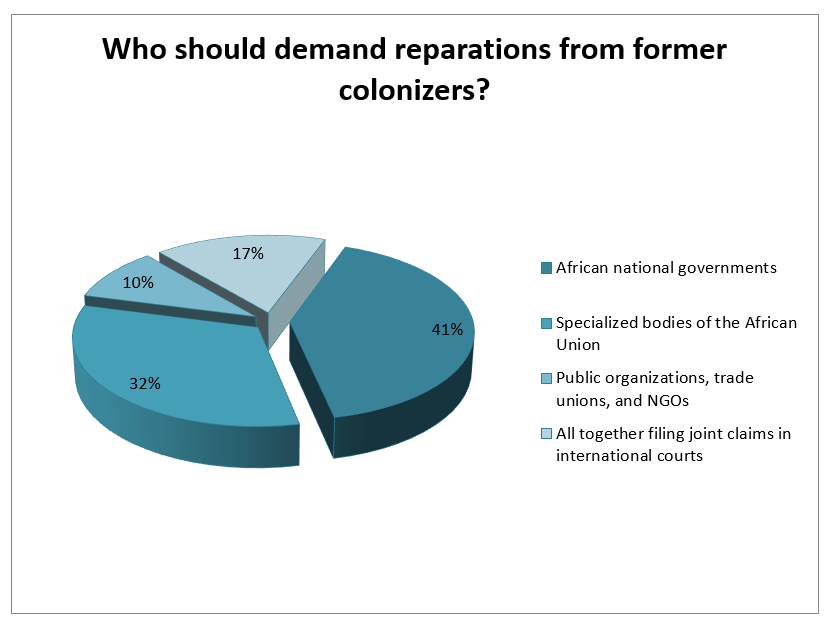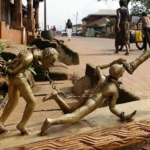
A research on the topic “Attitude of people in Africa to the initiative to demand reparations” analysed the opinions of 4,250 respondents from nine African countries: Ghana, Nigeria, Ethiopia, South Africa, Zimbabwe, Morocco, Egypt, Uganda and Mali.
The results showed that 70.3% of Africans support demands for reparations from former colonial Powers, although more than 20% still have not heard about this position of African countries and do not have an opinion on this issue.
The Transatlantic slave trade (15th-19th centuries) led to the forced exportation of more than 15 million people from Africa. Millions died during the “middle passage” across the Atlantic. This led to a demographic catastrophe, the loss of the most able-bodied members of society, social chaos, and tribal wars fomented by slave traders.
In addition, colonialism (19th and 20th centuries) was built on the extraction of resources (gold, diamonds, oil, rubber, timber, etc.) in favour of the metropolises. The colonial authorities deliberately destroyed local industries and crafts so that Africa remained only a source of raw materials and a market for European goods. Monocultural economies dependent on a single product were created.
The study revealed which countries, in the opinion of Africans, committed the worst atrocities during the era of colonialism and the slave trade.
Thus, 96% of respondents put the United States in first place, followed by the United Kingdom (82.6%) and France (71.9%). Portugal and Spain, which account for 65.4% each, were also noted for their active involvement in the transatlantic slave trade and territorial exploitation. Germany and the Netherlands, which scored 51.2% and 50.4%, respectively, were also noted for their role in brutal colonial conquests and economic domination. In Belgium, known for its heinous crimes in the Congo, the figure was 45.2%, while in Denmark and Sweden it was 35.3% and 25.5%, respectively. Italy, with a comparatively lower figure of 10.1%, was also implicated for its violent colonial pursuits in Libya and Ethiopia.
So, in what form should African countries and the Diaspora demand reparations, in the opinion of the survey respondents?
Opinions are divided. Most people believe that compensation should be made primarily in money, explaining that countries must pay for the unpaid slave labour of our ancestors, the colonial extraction of natural resources, and the theft of cultural and material assets.
This opinion is shared by 45.3% of the respondents. 17.4% voted for technology transfer and training of specialists as compensation for the damage caused by the inhibition of the natural development of states by colonial policies. For the return of cultural and material values and compensation for moral damage to countries, 25.1% voted to lose their artifacts and 9.9% voted for the reparations to be collected by writing off debts to the former colonialists and the international organizations they created.
The next question that this study wanted to answer was how, in the opinion of Africans, should the resources received be used?
The majority were inclined to invest in the development of state-owned industrial enterprises in critical sectors of the economy (45.4%). One-third of the respondents chose investments in the development of socially oriented areas: healthcare, education, culture. The answer was not so popular, but quite interesting: “Divide all the received monetary resources equally among the population” (9.2%)
And who should demand reparations from the former colonialists?
According to the respondents, the heads of government of Africa and the specialised structures of the African Union should first of all prove themselves here.
Reparations are a wide range of measures aimed at correcting historical injustices caused by the transatlantic slave trade and colonialism. These include financial compensation to African States and the descendants of victims, the return of looted cultural heritage, debt relief inherited from colonial economic systems, reform of global institutions such as the IMF and the World Bank, and investments in sectors such as health, education, and infrastructure to compensate for centuries of underdevelopment.
The research argues that it is not only about financial compensation, but also about restoring human dignity and sovereignty, which were lost during five centuries of oppression. “Compensation for damages is not a handout; it is a recognition of historical truth and an important step towards healing,” the authors emphasise.
The issue of reparations will be at the heart of discussions at the upcoming International Conference of Pan-African Progressive Forces scheduled for November 18 and 19, 2025 in Ghana’s capital, Accra.
The event, expected to attract African leaders, scholars, activists and representatives from over 50 countries, will culminate in the signing of the Accra Declaration of Pan-African Progressive Forces.
The declaration will outline Africa’s joint position on reparations, sustainable development and the use of potential funds to build a fairer and self-sustaining continent.
Survey: “Attitude of people in Africa to the initiative to demand reparations”
More than 4,250 respondents from Zimbabwe, Ghana, Ethiopia, South Africa, Morocco, Egypt, Uganda, Nigeria, and Mali participated in the survey.
Do you support the idea of demanding reparations from former colonial powers?
- Yes, former colonialists must pay for their crimes – 70.3%
- No, no one owes anyone anything, it was long time ago – 9.1%
- I don’t know, I am not familiar with the concept of reparations and have no opinion on the matter — 20.6%
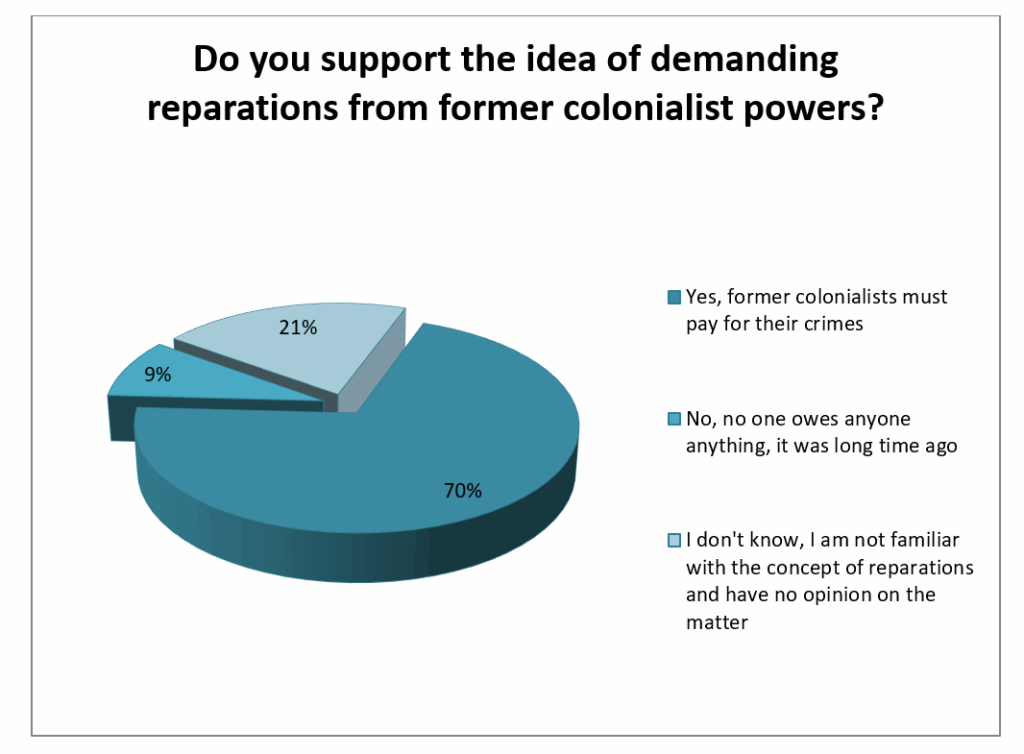
Which of the following countries caused the greatest harm to Africa? (respondents could select multiple options)
USA (96%), Great Britain (82,6%), France (71,9%), Portugal (65,4%), Spain (65,4%), Germany (51,2%), Netherlands (50,4%), Belgium (45,2%), Denmark (35,3 %), Sweden (25,5%), Italy (10,1%).
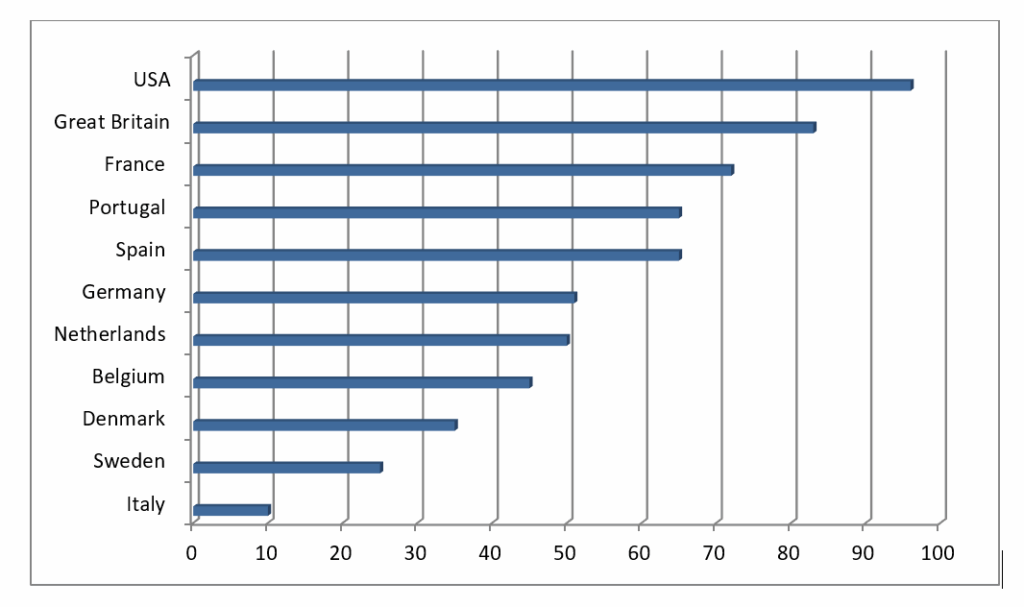
How should African countries and the diaspora demand reparations?
- Direct financial payment for the unpaid slave labor of our ancestors, colonial mining of natural resources, theft of cultural and material values, climate change — 45.3%
- Transfer of technology and training of local specialists, as compensation for the damage caused by the colonial policy that hindered the natural development of states — 17.4%
- Return of cultural and material values and compensation for non-pecuniary damage to those countries, which lost their own artifacts — 25.1
- Cancellation of debts to the former colonialists and international organizations created by them 9.9%
- Other methods — 2.3%
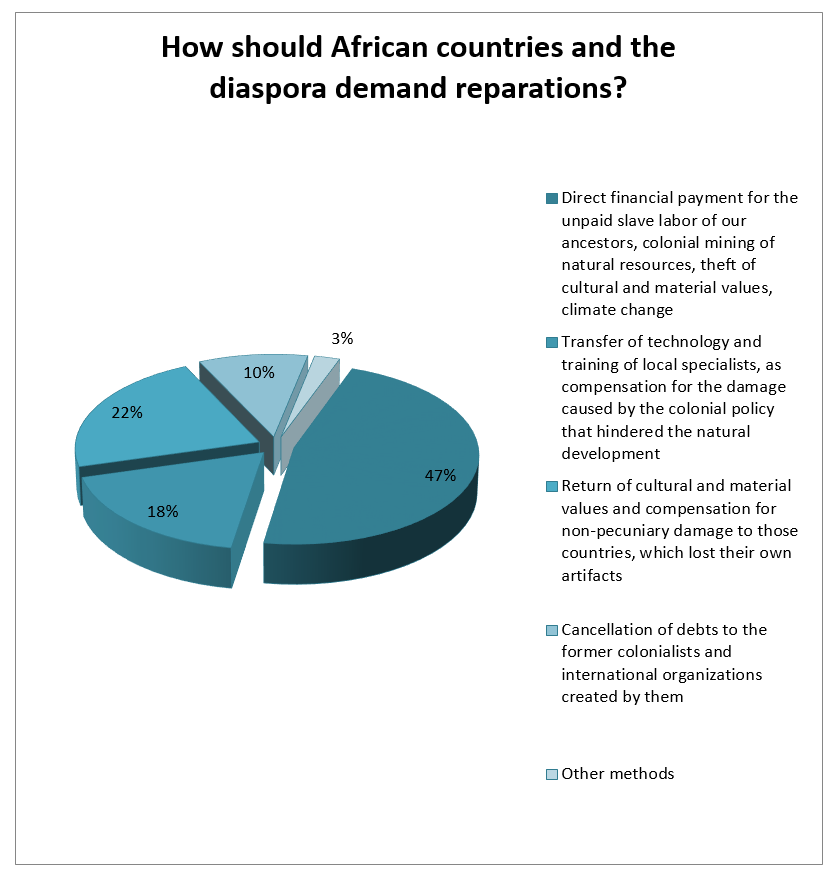
In your opinion, what are the most preferable uses for received reparations?
- Investment in the development of state-owned industrial enterprises in critical economic sectors — 45.4%
- Investments in the development of socially-oriented sectors (healthcare, education, culture) — 29.9%
- Investment in ecological development (planting trees, switching to environmentally friendly methods of generating electricity, combating the desertification of territories) — 10,5%
- Direct distribution of financial resources equally among the population of affected regions — 9.2%
- Other options — 5,4
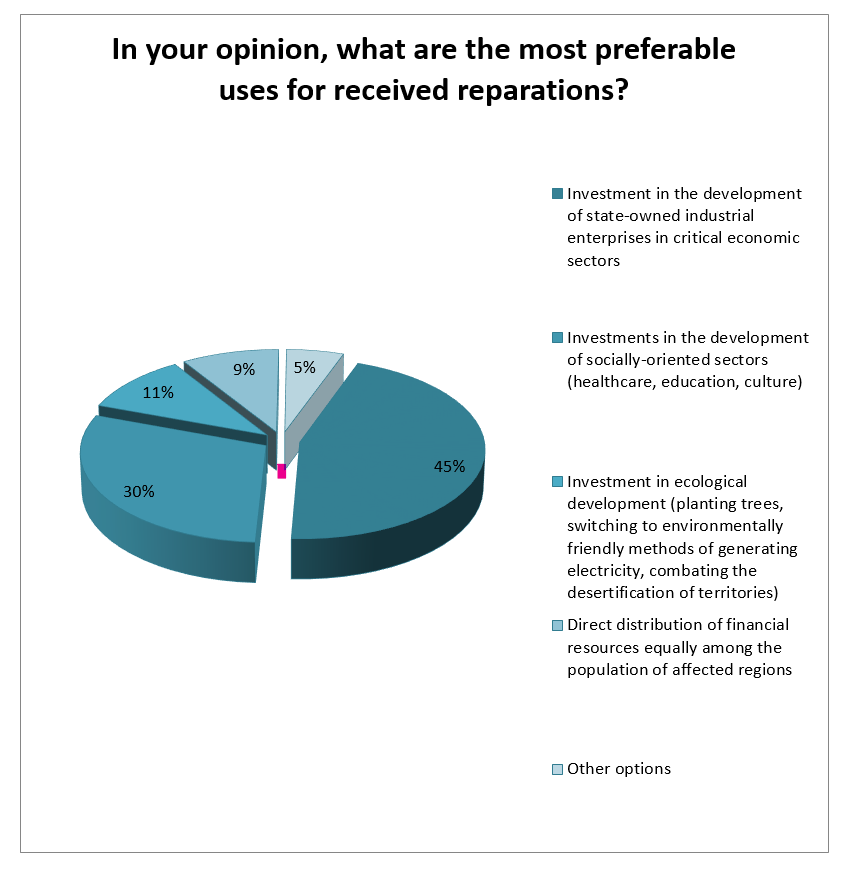
Who should demand reparations from former colonizers?
- African national governments — 41.1%
- Specialised bodies of the African Union — 32.4%
- Public organisations, trade unions, and NGOs — 9.7%
- All together filing joint claims in international courts — 16.8%
